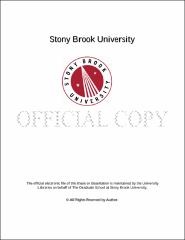| dc.identifier.uri | http://hdl.handle.net/11401/78306 | |
| dcterms.abstract | Pancreatic intraepithelial neoplasm (PanIN) is the most common type of precursor lesions of pancreatic ductal adenocarcinoma (PDAC). In the mouse pancreas, oncogenic Kras mutations are sufficient for spontaneous PanIN formation, which can be further expedited by cerulein-induced pancreatitis. Krüppel-like factor 5 (KLF5), a triple zinc-finger transcription factor, is differentially upregulated in pancreatic ductal adenocarcinoma (PDAC). Recent evidence shows that KLF5 is normally absent in acinar cells and is expressed in PanIN and PDAC in human tissues. The role of KLF5 in PanIN formation is unknown. To investigate whether KLF5 is required for early oncogenic Kras-driven tumorigenesis, I developed genetic engineered mouse models that combined inducible Klf5 knockout with oncogenic Kras expression in adult pancreatic acinar cells (Ptf1a-Cre ERTM;Klf5fl/fl, Ptf1a-CreERTM;LSL-Kras G12D, Ptf1a-CreERTM;LSL-KrasG12D;Klf5 fl/fl). Klf5 knockout reduced oncogenic Kras-induced PanIN formation. Furthermore, Klf5 knockout mice failed to develop acinar-to-ductal metaplasia (ADM), a type of transformation that is triggered by pancreatitis and precedes PanIN formation. Transcriptomic analysis showed that Klf5 knockout restored normal expression of genes that were altered by oncogenic KRAS signaling. These data showed that KLF5 is required for early pancreatic tumorigenesis induced by oncogenic KRAS. Furthermore, transcriptomic profiling identified NDRG2 as a potential inhibitor of ADM. To investigate the effect of Klf5 depletion on proliferation of pancreatic cancer cells, I depleted KLF5 in mouse pancreatic cell lines using a system that allows for the expression of Klf5-specific shRNA (or proper scrambled shRNA control) upon doxycycline induction. Klf5 knockdown in mouse pancreatic cancer cells line resulted in dosage-dependent reduction in cancer cell proliferation, possibly due to cell cycle arrests. Klf5 knockdown in mouse pancreatic cancer cells also increased expression of DNA damage response genes, decreased expression of ductal marker, and decreased tumor growth in mouse subcutaneous allograft model. In summary, the data showed that KLF5 plays a diverse range of pro-oncogenic roles during initiation as well as progression of pancreatic cancer. | |
| dcterms.available | 2018-10-11 | |
| dcterms.contributor | Advisors: Yang, Vincent W.; Frohman, Michael A.; Miller, W. Todd; Bialkowska, Agnieszka B.; Lu, Weiqin | |
| dcterms.creator | He, Ping | |
| dcterms.date | 2018 | |
| dcterms.dateAccepted | 2018-07-03T17:31:38Z | |
| dcterms.dateSubmitted | 2018-07-03T17:31:38Z | |
| dcterms.description | Department of Molecular and Cellular Biology | |
| dcterms.description | Dissertation | |
| dcterms.extent | 144 pages | |
| dcterms.format | application/pdf | |
| dcterms.identifier | http://hdl.handle.net/11401/78306 | |
| dcterms.identifier | He_grad.sunysb_0771E_13624.pdf | |
| dcterms.issued | 2018-01-01 | |
| dcterms.language | en | |
| dcterms.provenance | Submitted by Jason Torre (fjason.torre@stonybrook.edu) on 2018-07-03T17:31:38Z
No. of bitstreams: 1
He_grad.sunysb_0771E_13624.pdf: 3887278 bytes, checksum: 981cdf585ffc927eb044bfaea8bb8f06 (MD5) | |
| dcterms.provenance | Made available in DSpace on 2018-07-03T17:31:38Z (GMT). No. of bitstreams: 1
He_grad.sunysb_0771E_13624.pdf: 3887278 bytes, checksum: 981cdf585ffc927eb044bfaea8bb8f06 (MD5)
Previous issue date: 2018-01-01 | |
| dcterms.publisher | Stony Brook University | |
| dcterms.subject | Medicine, Genetic Engineered Mouse Model, Cytology, KRAS, Molecular biology, Krüppel-like Factor 5, Oncogen, Pancreatic Cancer | |
| dcterms.title | The Role of Krüppel-like Factor 5 in the Pathogenesis of Pancreatic Ductal Adenocarcinoma | |
| dcterms.type | Text | |

